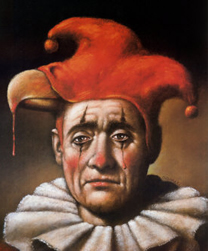KSO's "Rigoletto" Scores in Lexington
Mary Ellyn Hutton
Posted: Jan 12, 2009 - 12:57:20 PM in
reviews_2009

"The Hunchback of Mantua" KSO poster for Verdi's "Rigoletto"
|
The Kentucky Symphony Orchestra remains a wonder.
The “Little Orchestra that Could” (budget and staff-wise) certainly can, and they did it again Sunday afternoon (Jan. 11).
Music director James R. Cassidy, a stellar cast of young singing actors, a 62-piece orchestra and a few KSO volunteers loaded quickly and efficiently onto two buses in the Northern Kentucky University parking lot, drove to Lexington, where they disembarked at the University of Kentucky’s Singletary Center, did Verdi’s “Rigoletto” proud and three hours later, returned to Cincinnati.
The concert was a repeat of their concert performance of “Rigoletto,” which they premiered at NKU’s Greaves Hall Friday night (Jan. 9). Though having to adjust quickly to Singletary’s reverberant acoustics – a factor that can cover a multitude of sins while also making them more likely, as one orchestra member put it – the ensemble turned in a thrilling performance of Verdi’s tragedy about love, lust and paternal devotion. And all on only five rehearsals (four with the cast).
Concert opera (and music theater) has become an important niche for the KSO and one of the best things they do. Somehow, Cassidy, most likely through his connections as a graduate of the conducting program at the University of Cincinnati College-Conservatory of Music (historically a vocal powerhouse), can put together ideal casts almost like pulling rabbits from hats. Sunday was no exception.

Tenor Marc Schreiner
|
Singing the amoral, womanizing Duke of Mantua was tenor Marc Schreiner, tall, handsome, oozing with charm and possessor of a lyric instrument of arresting range and color.

Soprano Elizabeth Andrews Roberts
|
Soprano Elizabeth Andrews Roberts, long blonde curls setting off a gold-tinged voice, was angelic as Gilda, the young innocent who falls into the Duke’s clutches and unfortunately, falls in love with him, too.

Baritone Stephen Gaertner
|
Most impressive of all perhaps, as the hunchbacked court jester (Gilda’s father) was baritone Stephen Gaertner, who revealed himself as a star Rigoletto-of-the future with his warm, burnished voice and potent acting skills.
Bass Gustav Andreassen used his dark voice menacingly as the hired assassin Sparafucile, while contralto Karmesha Peake put sass and feeling into the role of Sparafucile’s sister Maddalena. Roberts and Andreassen are graduates of CCM. Supporting roles were filled with distinction by members of the University of Kentucky Opera Theatre, who under its director Everett McCorvey, has collaborated with the KSO for the third time in six years (“Otello” and “La Boheme” were performed in 2006 and 2008, respectively, both in Northern Kentucky and Lexington).
Men of the KSO Chorale filled the roles of courtiers and servants and added a spine-tingling edge to the the moaning of the wind during the act III storm scene.
Based on Victor Hugo’s “Le roi s'amuse,” “Rigoletto” is about a court jester who taunts the victims of his master’s lechery. Monterone, the vengeful father of one of the girls (powerfully sung by Mark Elliott Golson II) curses Rigoletto, who then sees his own daughter ravished by the Duke. Rigoletto tries to open Gilda’s eyes to the Duke’s treachery and hires an assassin to kill him, but Gilda, who truly loves the Duke, intervenes to foil the plot and is killed in his stead.
The KSO performance was one high point after another. My favorites included:
Roberts’ “Caro nome” (“Dear name”), sung in the wake of the Duke’s amorous advances disguised as a “poor student,” where she spun glittering coloratura and radiated ripeness and beauty in a flesh-colored gown with spaghetti straps.
The end of act I, where Gaertner, comprehending Gilda’s fate, slowly turned toward the audience as the music rose to a climax to his horror-stricken “la maledizione!” (“the curse”).
Gaertner’s pretended nonchalance as Rigoletto tries to learn Gilda’s whereabouts from the noblemen who carried out the abduction -- with, to make it worse, his own unknowing assistance – and then begs them for pity as he learns the truth.
Any of the duets between Gaertner and Roberts as father and daughter, which ranged from tender devotion to heart-rending sympathy (“Piangi fanciulla,” “Weep child”) to the heroic, trumpet-laced “Si, Vendetta” ending act II, where Rigoletto” vows revenge on the Duke, whom the conflicted Gilda still loves.
The famous quartet in the last act (“Bella figlia dell ‘amore”) where Gilda and Rigoletto watch and respond (differently) to the Duke’s flirtation with Maddalena. And, last but not least, the Duke’s carefree, cynical “La donna e mobile” (“Women are fickle”), the opera’s most famous number, which Schreiner performed with swagger and full-throated ease (he had seemed to tire a bit in the previous act).
Cassidy maintained a sure and careful hand on the podium, ever-alert to the hall’s tricky acoustics and possible ensemble problems. The orchestra performed beautifully for him, with outstanding solo work by individual string, wind and brass players, and a lush, corporate sound that testified to the excellence of the KSO's 2008-09 edition (the KSO is a mixed core/free lance ensemble that changes from year to year).
The audience at Singletary -- smallish, no doubt due to the wintry weather -- responded with abundant bravos, applause and a standing ovation.
Next up for the KSO is “Czech Please,” an all-orchestral program of Dvorak, Janacek, Smetana and Vorisek, April 4 and 5 in Greaves Hall at NKU. For information and tickets, visit www.kyso.org.




